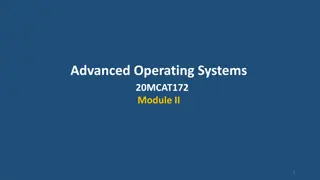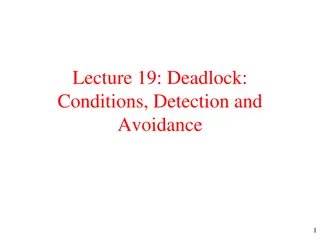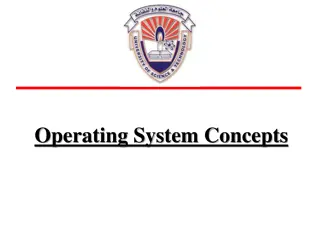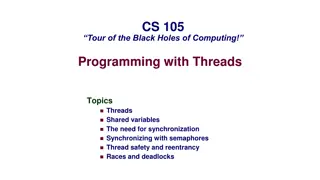Understanding Distributed Mutual Exclusion in Operating Systems
In distributed systems, the problem of mutual exclusion arises when multiple sites/processes need to access shared resources concurrently. Unlike in single-computer systems, distributed systems lack shared memory, leading to the need for communication-based approaches rather than shared variables li
0 views • 49 slides
Understanding Deadlocks in Operating Systems
Deadlocks in operating systems occur when processes hold resources and wait for others, leading to a state where none can progress. Processes may hold resources while requesting more, resulting in a standstill known as a deadlock. This deadlock arises from conditions like mutual exclusion, hold and
0 views • 25 slides
Understanding Database Deadlocks and Detection
Database Management Systems (DBMS) often face deadlocks, which are situations where transactions are waiting for each other to release data items, leading to a cycle in the wait-for graph. Deadlocks can be detected by analyzing the wait-for graph periodically. If a deadlock is detected, a victim tra
0 views • 10 slides
Understanding Deadlock: Conditions, Detection, and Avoidance
Explore strategies for dealing with deadlocks, from detection and recovery to dynamic avoidance. Learn about deadlock avoidance methods like being conservative in resource granting and dive into safe and unsafe states, the Banker's algorithm, and the four conditions for deadlock. Discover how to pre
0 views • 15 slides
Understanding Deadlock Avoidance in Operating System Concepts
Deadlock Avoidance is a critical concept in operating system design to prevent system resources from entering a deadlock state. By requiring additional information about resource requests and utilizing algorithms like the banker's algorithm, systems can dynamically allocate resources to avoid circul
1 views • 29 slides
Understanding Multithreading in Computing
Exploring the realms of multithreading in computing delves into topics like shared variables, synchronization with semaphores, thread safety, reentrancy, races, and deadlocks. The content illustrates the differences between the traditional and alternate views of a process, the structure of a process
0 views • 44 slides
Understanding and Avoiding Deadlocks and Livelocks in Concurrent Programming
Deadlocks and livelocks are common issues in multi-threaded programming. Deadlocks occur when two or more threads are waiting for each other to release a resource, leading to a standstill. Livelocks, on the other hand, involve threads that are actively trying to resolve a resource conflict but end u
0 views • 43 slides






